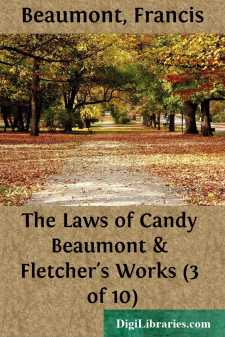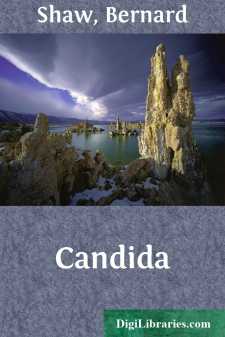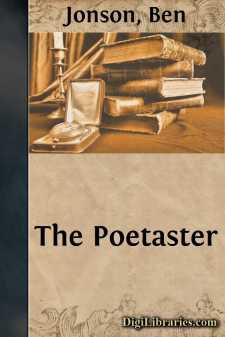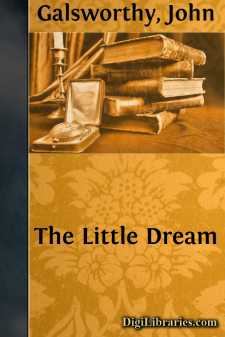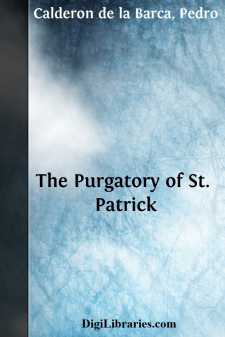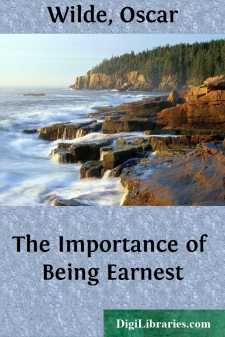Drama Books
Sort by:
by:
Oscar Wilde
FIRST ACT SCENE The octagon room at Sir Robert Chiltern’s house in Grosvenor Square. [The room is brilliantly lighted and full of guests. At the top of the staircase stands lady chiltern, a woman of grave Greek beauty, about twenty-seven years of age. She receives the guests as they come up. Over the well of the staircase hangs a great chandelier with wax lights, which illumine a large...
more...
by:
Francis Beaumont
Actus PrimusScena Prima Enter Gaspero, and Melitus MelitusSir, you're the very friend I wish'd to meet with,I have a large discourse invites your earTo be an Auditor. GasperoAnd what concerns it? MelitusThe sadly thriving progress of the lovesBetween my Lord, the Prince, and that great Lady,Whose insolence, and never-yet-match'd Pride,Can by no Character be well exprest,But in her only...
more...
by:
Bernard Shaw
ACT I A fine October morning in the north east suburbs of London, a vast district many miles away from the London of Mayfair and St. James's, much less known there than the Paris of the Rue de Rivoli and the Champs Elysees, and much less narrow, squalid, fetid and airless in its slums; strong in comfortable, prosperous middle class life; wide-streeted, myriad-populated; well-served with ugly iron...
more...
by:
Ben Jonson
INTRODUCTION THE greatest of English dramatists except Shakespeare, the first literary dictator and poet-laureate, a writer of verse, prose, satire, and criticism who most potently of all the men of his time affected the subsequent course of English letters: such was Ben Jonson, and as such his strong personality assumes an interest to us almost unparalleled, at least in his age. Ben Jonson came of the...
more...
by:
John Galsworthy
SCENE I It is just after sunset of an August evening. The scene is aroom in a mountain hut, furnished only with a table, benches.and a low broad window seat. Through this window three rockypeaks are seen by the light of a moon which is slowly whiteningthe last hues of sunset. An oil lamp is burning. SEELCHEN, amountain girl, eighteen years old, is humming a folk-song, andputting away in a cupboard...
more...
Two of the dramas contained in this volume are the most celebrated of all Calderon's writings. The first, "La Vida es Sueno", has been translated into many languages and performed with success on almost every stage in Europe but that of England. So late as the winter of 1866-7, in a Russian version, it drew crowded houses to the great theatre of Moscow; while a few years earlier, as if to...
more...
ACT IV SCENE I. London. Before the Tower [Enter, on one side, QUEEN ELIZABETH, DUCHESS of YORK, and MARQUIS of DORSET; on the other, ANNE DUCHESS of GLOSTER, leading LADY MARGARET PLANTAGENET, CLARENCE's young daughter.]DUCHESSWho meets us here?—my niece Plantagenet,Led in the hand of her kind aunt of Gloster?Now, for my life, she's wandering to the Tower,On pure heart's love,...
more...
ACT I SCENE: The library of ASHER PINDAR'S house in Foxon Falls, a New Englandvillage of some three thousand souls, over the destinies of whichthe Pindars for three generations have presided. It is a large,dignified room, built early in the nineteenth century, with whitedoors and gloss woodwork. At the rear of the stage,—which is thefront of the house,—are three high windows with small, square...
more...
by:
Oscar Wilde
FIRST ACT SCENE Morning-room in Algernon’s flat in Half-Moon Street. The room is luxuriously and artistically furnished. The sound of a piano is heard in the adjoining room. [Lane is arranging afternoon tea on the table, and after the music has ceased, Algernon enters.] Algernon. Did you hear what I was playing, Lane? Lane. I didn’t think it polite to listen, sir. Algernon. I’m sorry...
more...
by:
Thomas Godfrey
THOMAS GODFREY, Jr. (1736-1763) Thomas Godfrey, Jr., was born in Philadelphia, on December 4, 1736, the son of a man who himself won fame as an inventor of the Quadrant. Godfrey, Senior, was a friend of Benjamin Franklin, the two probably having been drawn together by their common interest in science. When Godfrey, Senior, died, December, 1749, it was Franklin who wrote his obituary notice. Young...
more...



